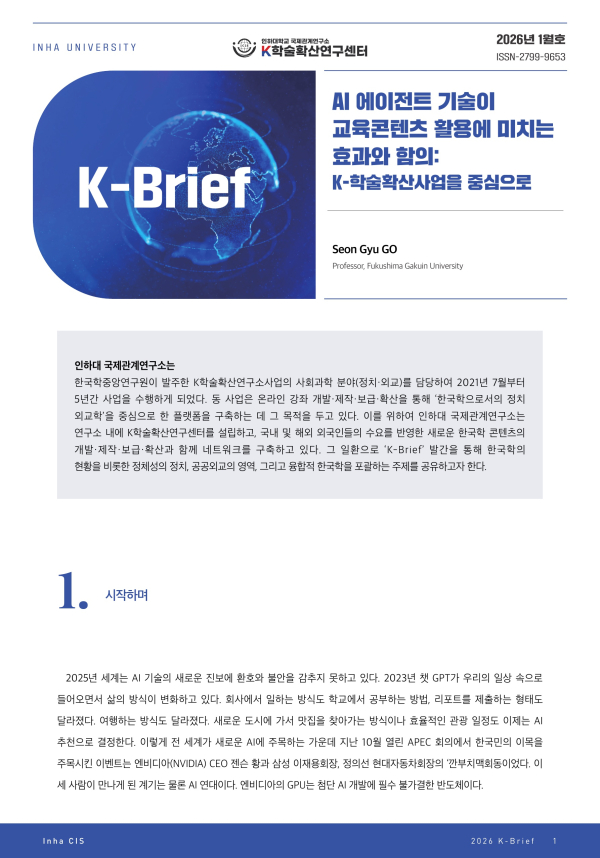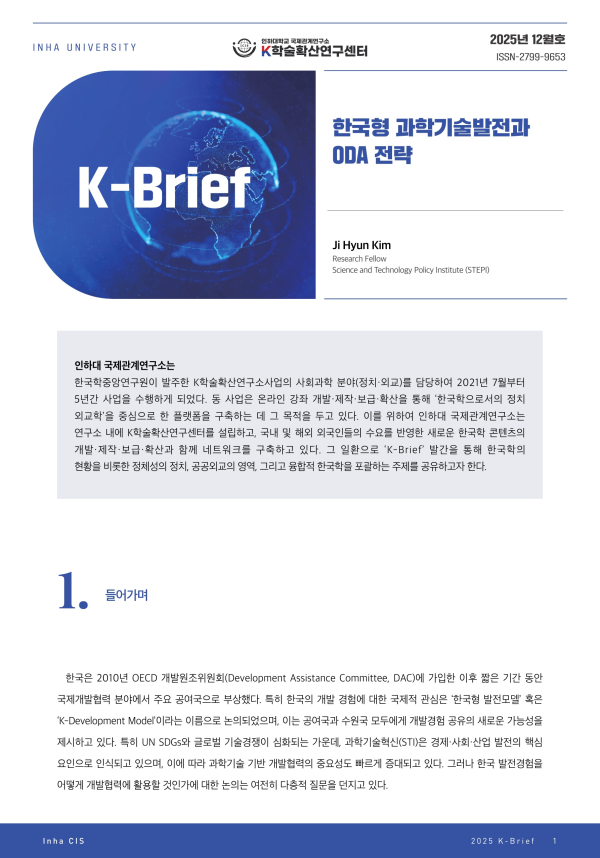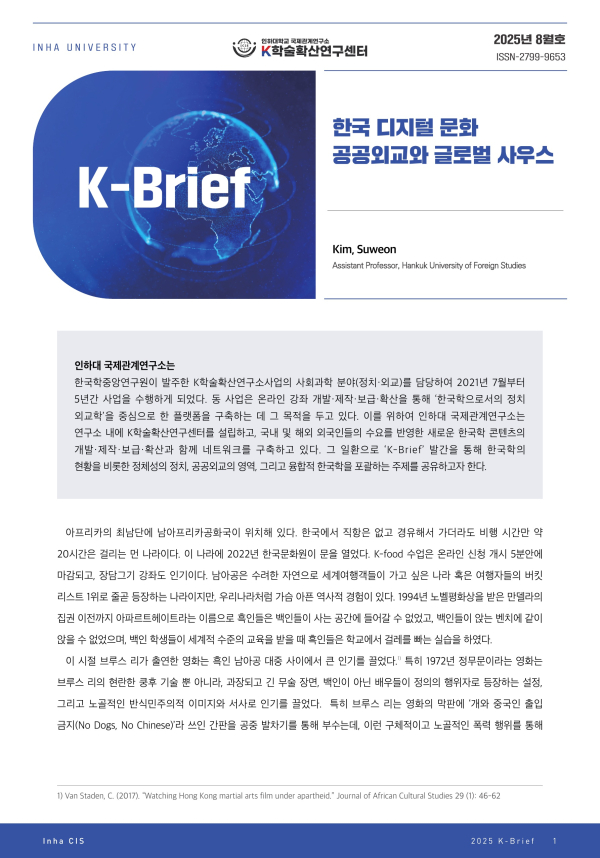Main visual Area
- To establish a new content platform for Korean studies in political diplomacy.
- To develop Korean Studies’ contents in social sciences that reflect the needs of domestic and foreign learners.
- To develop, produce, and disseminate online courses.
- To nurture future generations of Korean studies and establish Korean Studies Networks overseas.
Notice
- 2026 Inha University K-MOOC Korean Studies Course Promotion Contest Announcement 2026-01-26
- 3rd K-Connectors Recruitment Notice 2025-07-04
- 2025 Essay Contest for INHA K-MOOC Lectures 2024-12-21
-
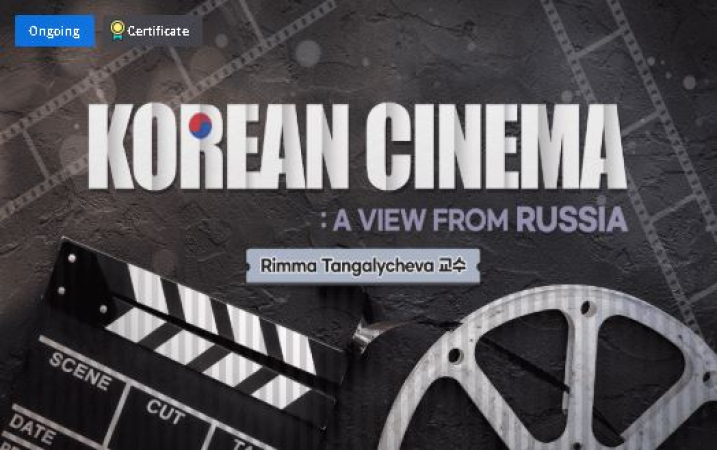 Content Convergence
Content Convergence(Lecture included)Korean cinema: a view from Russia
Course Titile Korean cinema: a view from Russia Professor Rimma Tangalycheva (Saint Petersburg State University) Course Overview This course provides an overview of Korean cinema from its invention to the present day. The purpose of the course is to acquaint students interested in Korean studies with the main achievements of Korean cinema. Attention is paid to the history of Korean cinema of the 20th century, the work of the popularizer of Korean history and culture Im Kwon-taek. Today, the international and festival success of Korean cinema is associated with directors such as Lee Chang-dong, Bong Joon-ho, and Hong Sang-soo, and their films are also covered in this course. The course includes a sociological analysis of Yeong Sang-ho's "Train to Busan", which presents alternative scenarios for the future in the modern world and has become very popular in different countries of the world. The final lecture “Feminist Wave in South Korean Cinema" is dedicated to the achievements of the young generation of female directors. The peculiarity of the course is that it represents the Russian vision of Korean cinema, a specific view of Russian viewers and film critics. Another distinguishing feature of the course is that it analyzes contemporary South Korean films from a sociological perspective. Course Schedule Week 1 Introduction. History of Korean Cinema Week 2 Im Kwon-taek: the Living Legend of Korean Cinema Week 3 The Sorrowful Realism of Lee Chang-dong Week 4 Bong Joon-ho: Cinema for Social Change? Week 5 Zombie Apocalypse Yeon Sang-ho Week 6 Mathematical Impressionism by Hong Sang-soo Week 7 Feminist Wave in South Korean Cinema
- 2025-06-16
- 493
-
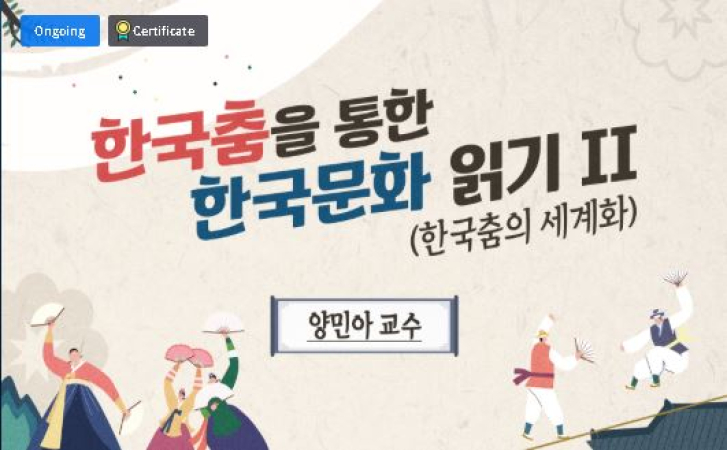 Content Convergence
Content Convergence(Lecture included) Understanding Korean Culture through Korean Dance II (Globalization of Korean Dance)
Course Titile Understanding Korean Culture through Korean Dance II (Globalization of Korean Dance) Professor Min A Yang (Chung-Ang University) Course Overview This lecture will examine the changes in traditional Korean dance from the mid-19th century to the end of the Joseon Dynasty as it interacted with other cultures. In particular, we will examine the globalization process of Korean dance through the tendency of Korean dance to be enjoyed by Korean people scattered around the world since the mid-19th century. First, we will examine the migration history of the Korean diaspora to the former Soviet Union (Russia and Central Asia), Yanbian, China, Japan, and Hawaii, USA, and how the traditional performing arts represented by dance are enjoyed and the meaning of traditional performing arts activities in diaspora cultures. On the other hand, Korean people who lived in the former Soviet Union have been re-migrating to Korea since the 2000s, forming a reversed form of diaspora in Korean society and engaging in various cultural and artistic activities. In this lecture, we will consider the social role and value of performing arts activities in the era of interculturalism through the example of the cultural activities of the Gwangju Korean Village. Course Schedule Week 1 History of modernizing and globalizing traditional dance of the Joseon dynasty Week 2 Goryeoin in Primorsky and modernizing performing art of the Joseon dynasty during the Japanese colonial period Week 3 Goryeoins’ performing art and Korea theaters during Soviet Union period Week 4 The art performance and meaning to Goryeoin after dissolution of Soviet Union Week 5 Korean in Yanbian, China’s performing art activities Week 6 Korean Japanese’s performing art activities Week 7 Korean in Hawaii performing art activities
- 2025-06-13
- 529
-
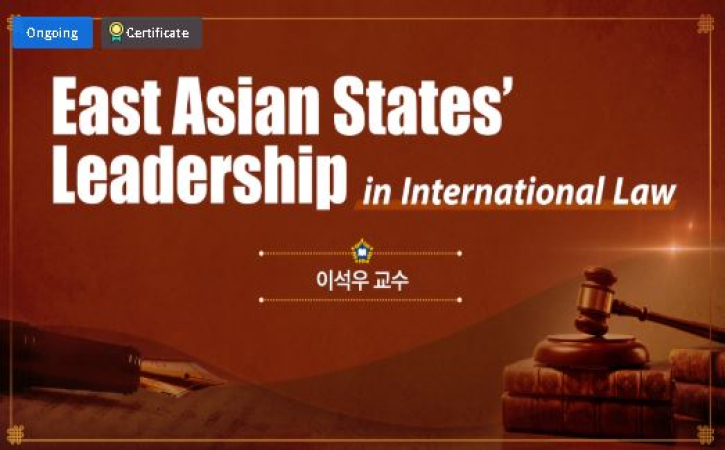 Content Convergence
Content Convergence(Lecture included) East Asian States’ Leadership in International Law
Course Titile East Asian States’ Leadership in International Law Professor Seokwoo Lee (Inha Law School) Course Overview This lectures will provide for enhancing discussions and dialogue to advance what Western scholars might classify as “outsiders’ perspectives” to international law, which are currently not present within mainstream international law textbooks. Course Schedule Week 1 East Asian States’ Leadership in International Law Week 2 East Asian States’ Leadership in International Law 2 Week 3 East Asian States’ Leadership in International Law 3 Week 4 Asian State Practice in the Domestic Implementation of International Law 1 Week 5 Asian State Practice in the Domestic Implementation of International Law 2 Week 6 East Asia’s Cultural Influence on the Law of the Sea 1 Week 7 East Asia’s Cultural Influence on the Law of the Sea 2
- 2025-06-13
- 483
-
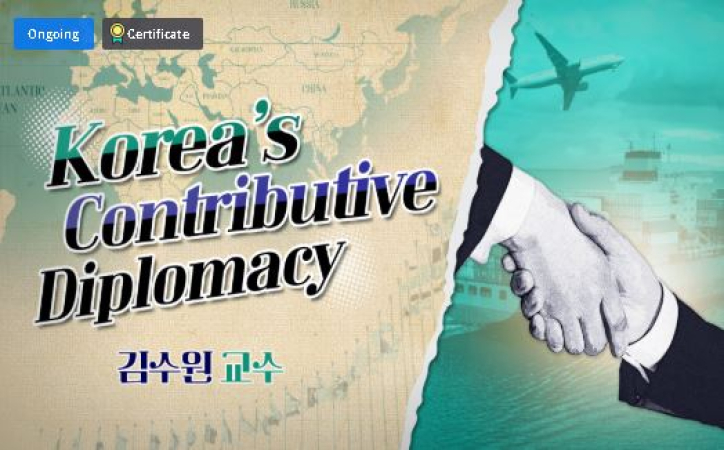 Public Diplomacy and the World
Public Diplomacy and the World(Lecture included) Korea’s Contributive Diplomacy
Course Titile Korea’s Contributive Diplomacy Professor Suweon Kim (Hankuk University of Foreign Studies) Course Overview Provision of global public goods is a genuine way of practicing public diplomacy. Contributive diplomacy is a straightforward means to make the world a better place and to bolster soft power. This course introduces varied practices of contributive diplomacy of Korea including sharing development experience, building a national museum, inviting young film producers for training, designing a new city, and deploying anti-piracy naval units. Course Schedule Week 1 "Contributive Diplomacy" of Korea: Sharing Knowledge Week 2 ICT Week 3 Cities Week 4 Film Week 5 Sports Week 6 Peace Week 7 Cultural Heritage Diplomacy
- 2025-06-13
- 493
-
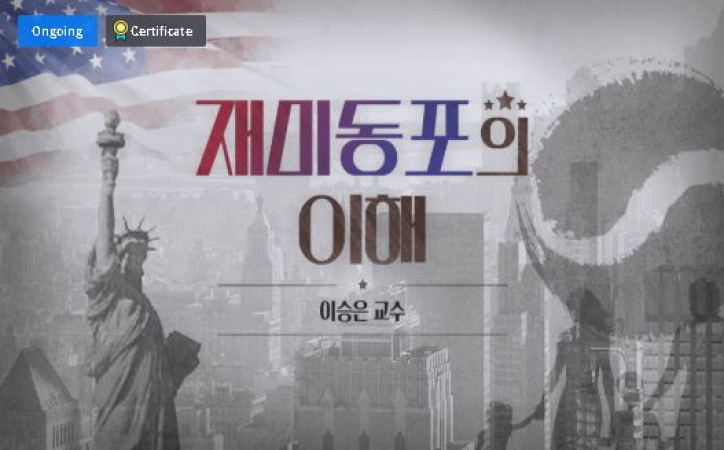 Identity Politics
Identity Politics(Lecture included) Understanding Korean Americans
Course Titile Understanding Korean Americans Professor Seungeun Lee (University of Massachusetts, Lowell) Course Overview This course examines the past, present, and future of Korean Americans. First, we will examine the history of the Korean diaspora. The history of Korean Americans living in the United States is the longest of any immigrant settlement. The history of Korean immigration to the United States can be broadly categorized into three phases: the initial phase, which was triggered by the Hawaiian immigration, the post-war immigration period, and the large-scale immigration through the 1965 immigration reform. The first phase includes immigration to Hawaiian sugar cane plantations, migration to the American West, and pre-Korean War immigration, while the second phase includes the period of increased immigration from Korea and other parts of Asia, beginning with the 1965 immigration reform. The Los Angeles riots of the early 1990s brought about a fundamental change in the Korean American community in the U.S. After the riots, Korean Americans began to diversify their resources beyond the traditional “ethnic” economic centers of Korean American social networks to form alliances with multiracial, multiethnic, and Asian Americans. Second, the book examines the diverse characteristics of Korean Americans by type of immigration, time of immigration, and generation. As a result of the long history of Korean American migration, younger generations (the next generation) have experienced quite different migration experiences (birthplace and nationality, migration status, mode, timing, purpose, socioeconomic status, etc.) and life in the United States than older generations. In addition, Korean Americans who migrated to the United States from a third country, as well as “biracial/multiracial” Korean Americans and Korean adoptees who have one (grand)parent of a different race/ethnicity, are also covered. It also explores return/reverse immigration, retirement immigration, and naturalization. This course examines the next generation of Korean American individuals and organizations and Asian American history. The course concludes with an examination of Korean American political participation, Korean language education, policy directions, and the future of Korean Americans. Course Schedule Week 1 Concept and history of Korean Americans Week 2 Korean Americans in the U.S. immigration Week 3 Various types of Korean migrations Week 4 Asian Americans Week 5 Future generation of Korean Americans Week 6 Korean adoptees Week 7 Overall issues related to Korean Americans and their future
- 2025-06-12
- 492
-
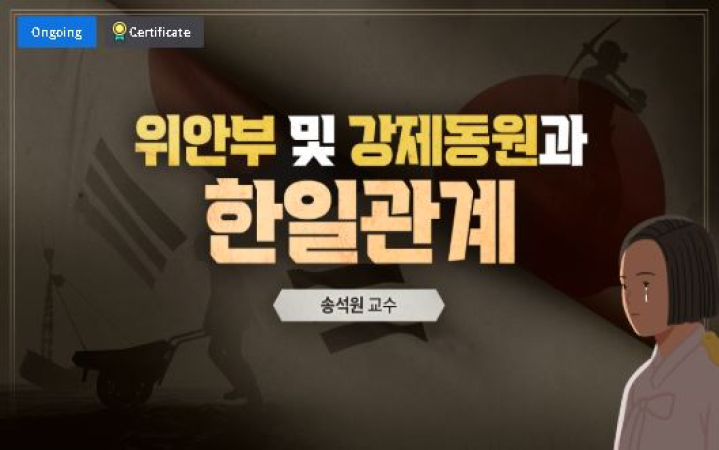 International Relations
International Relations(Lecture included) The Impact of Comfort Women and Forced Mobilization on Korea-Japan Relations
Course Titile The Impact of Comfort Women and Forced Mobilization on Korea-Japan Relations Professor Seok Won Song (Kyunghee University) Course Overview Starting from the study of Japan's imperialist formation process that led to the creation of Japanese military “comfort women” and forced laborers, this course is organized to summarize the specific “facts” of the problem and the “issues” surrounding those facts, and to consider the current situation of these “historical” issues and future challenges. Course Schedule Week 1 Korea-Japan relations and “history” issues Week 2 The rise of Japanese military “Comfort Women” issue Week 3 The essence and nature of the Japanese military “Comfort Women” issue Week 4 Traces of solving Japanese military “Comfort Women” issue Week 5 Suits and Disputes on Japanese military “Comfort Women” issue Week 6 Forced mobilized laborer issue Week 7 The challenges and Korea-Japan relations of the Japanese military “Comfort Women” and forced mobilized laborer issues
- 2025-06-12
- 517
-
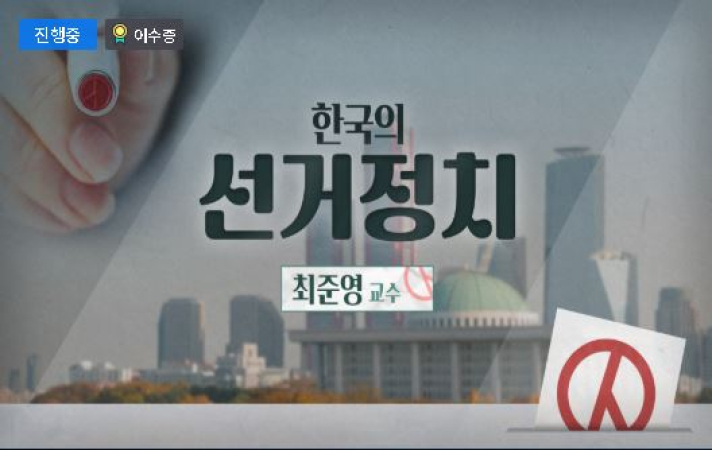 International Relations
International Relations(Lecture included)Election Politics in Korea
Course Titile Election Politics in Korea Professor JunYoung Choi (Inha University) Course Overview This course aims to provide a general introduction to how elections are conducted in South Korea in terms of institutions, history, and voter behavior. From a theoretical perspective, we will introduce the meaning of elections and representation in a democracy, and how political parties, which play a key role in elections, operate in Korea and what problems they face. The course also introduces the system, history, and characteristics of presidential, parliamentary, local, and by-election elections. Voter behavior is examined, focusing on regionalism, ideology and issues, and party unity. Course Schedule Week 1 Election and democracy Week 2 Parties in Korea Week 3 Presidential election Week 4 General election Week 5 Regionalism voting behavior Week 6 Political ideology and issue vote Week 7 Party identification
- 2025-06-12
- 514
-
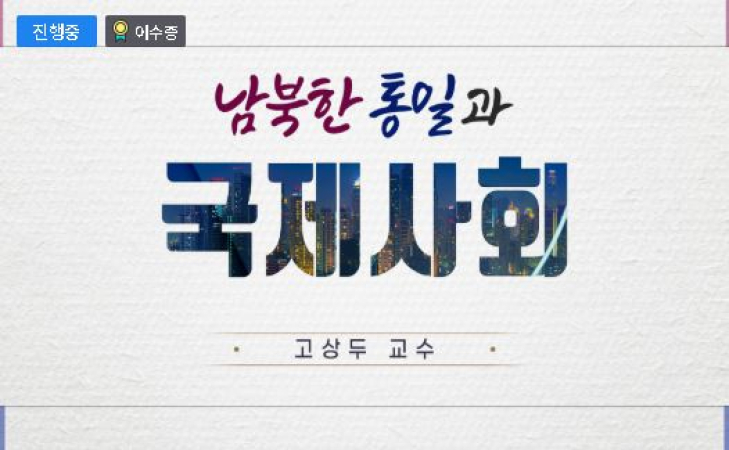 International Relations
International Relations(Lecture included) Unification of North and South Korea and the International Community
Course Titile Unification of North and South Korea and the International Community Professor Sang Tu Ko (Graduate School of Area Studies, Yonsei University) Course Overview Unification includes internal and external unification. Internal unification is a form of unification based on nationalism, and for this, efforts are required to increase the sense of national identity. Exchange and cooperation between the two Koreas fall under this category. External unification is the support of neighboring countries for the unification of the Korean Peninsula. To secure this, reconciliation and cooperation with neighboring countries are necessary. This lecture introduces the internal and external efforts that Korea is undertaking to promote the unification of the Korean Peninsula. Course Schedule (Click on the titles below)
- 2025-04-30
- 627
-
 International Relations
International Relations(Lecture included) Modern Korean Politics and Diplomacy
Course Titile Modern Korean Politics and Diplomacy Professor Jung Ho Kim, Inha University Course Overview This course covers the process through which modern Korea emerged in the international community, as well as the changes in Korean society and the characteristics of foreign relations during the period of opening ports. It examines significant events that influenced Korea's politics and diplomacy from the signing of the Treaty of Ganghwa in 1876 to Korea's liberation in 1945, in accordance with the historical flow of time. This includes the domestic and international situations of East Asian countries, particularly China and Japan, which were closely related to Korea at the time. Through this course, students will gain an understanding of the many events and national struggles Korea experienced during the modern period, as well as the driving forces behind its internal development. Course Schedule (Click on the titles below)
- 2025-04-30
- 588
-
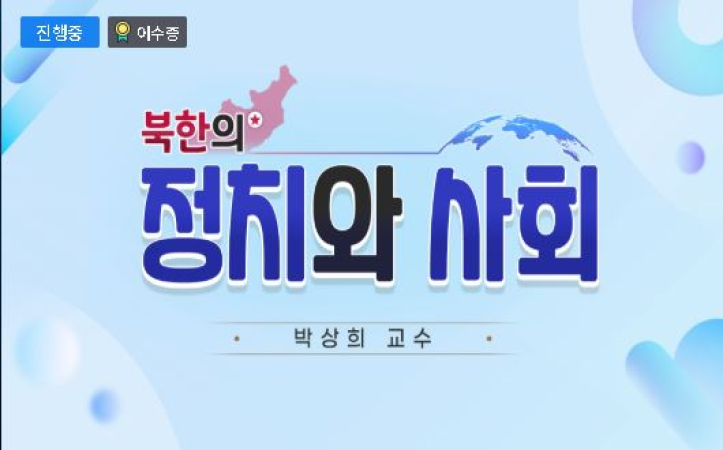 International Relations
International Relations(Lecture included) Politics and Society in North Korea
Course Titile Politics and Society in North Korea Professor Sang Hee Park, Inha Univeristy Course Overview It discusses the characteristics and changes in North Korea's politics, economy, and society. It provides an overview of the North Korean communist system and its characteristics, as well as insights into North Korean leaders and governing ideologies, through visual icons such as pictures and photographs. It also examines the contents and specific examples of the marketization of the North Korean economy and the subsequent changes in North Korean society. Course Schedule (Click on the titles below)
- 2025-04-29
- 693
-
 Identity Politics
Identity Politics(Lecture included) Understanding Korean Americans
Course Titile Understanding Korean Americans Professor Seungeun Lee (University of Massachusetts, Lowell) Course Overview This course examines the past, present, and future of Korean Americans. First, we will examine the history of the Korean diaspora. The history of Korean Americans living in the United States is the longest of any immigrant settlement. The history of Korean immigration to the United States can be broadly categorized into three phases: the initial phase, which was triggered by the Hawaiian immigration, the post-war immigration period, and the large-scale immigration through the 1965 immigration reform. The first phase includes immigration to Hawaiian sugar cane plantations, migration to the American West, and pre-Korean War immigration, while the second phase includes the period of increased immigration from Korea and other parts of Asia, beginning with the 1965 immigration reform. The Los Angeles riots of the early 1990s brought about a fundamental change in the Korean American community in the U.S. After the riots, Korean Americans began to diversify their resources beyond the traditional “ethnic” economic centers of Korean American social networks to form alliances with multiracial, multiethnic, and Asian Americans. Second, the book examines the diverse characteristics of Korean Americans by type of immigration, time of immigration, and generation. As a result of the long history of Korean American migration, younger generations (the next generation) have experienced quite different migration experiences (birthplace and nationality, migration status, mode, timing, purpose, socioeconomic status, etc.) and life in the United States than older generations. In addition, Korean Americans who migrated to the United States from a third country, as well as “biracial/multiracial” Korean Americans and Korean adoptees who have one (grand)parent of a different race/ethnicity, are also covered. It also explores return/reverse immigration, retirement immigration, and naturalization. This course examines the next generation of Korean American individuals and organizations and Asian American history. The course concludes with an examination of Korean American political participation, Korean language education, policy directions, and the future of Korean Americans. Course Schedule Week 1 Concept and history of Korean Americans Week 2 Korean Americans in the U.S. immigration Week 3 Various types of Korean migrations Week 4 Asian Americans Week 5 Future generation of Korean Americans Week 6 Korean adoptees Week 7 Overall issues related to Korean Americans and their future
- 2025-06-12
- 492
-
 Identity Politics
Identity Politics(Lecture included) Citizenship and Nationhood in Korea
Course Titile Citizenship and Nationhood in Korea Professor Chul Woo Lee, Yonsei University Law School Course Overview This lecture examines the boundaries between Korean citizens and Korean compatriots, the requirements for becoming a citizen and compatriot, and the status enjoyed as a citizen and compatriot. It broadly covers the world's realities and issues related to citizenship and nationhood and examines their institutional aspects. It also deals with knowledge of the Constitution of the Republic of Korea and other public laws, comparative legal knowledge of the legal systems of various countries, and issues of international law. Course Schedule (Click on the titles below)
- 2025-04-29
- 617
-
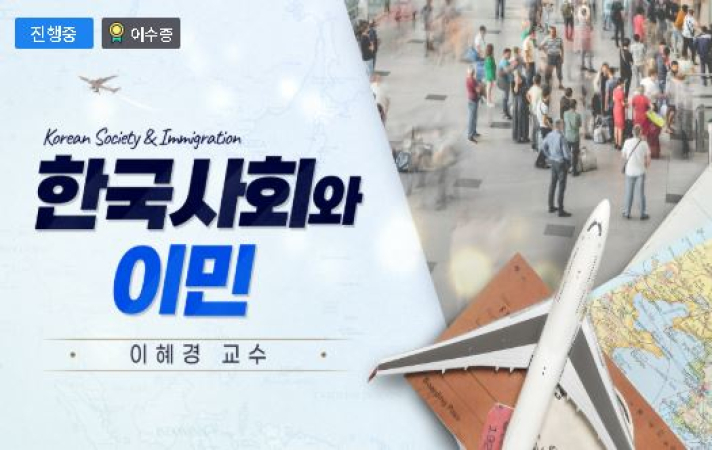 Identity Politics
Identity Politics(Lecture included) Korean Society and Immigration
Course Titile Korean Society and Immigration Professor Hye Kyung Lee (Dept. of Public Administration, Pai Chai University) Course Overview This lecture examines the overseas migration of Koreans as an effect of social change on immigration. It examines the three representative waves of domestic migration of foreigners: return migration of compatriots, labor migration of Southeast Asians, and marriage migration by type and period. Furthermore, it examines the formation of NGO-led civic movements and immigrant communities that influenced the formation and change of major immigration policies by period. Course Schedule (Click on the titles below)
- 2025-04-29
- 592
-
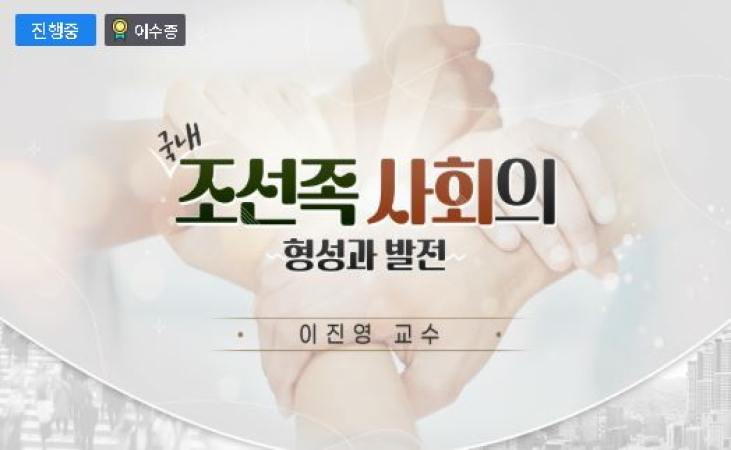 Identity Politics
Identity Politics(Lecture included) Formation and Development of the Korean-Chinese Society in Korea
Course Titile Formation and Development of the Korean-Chinese Society in Korea Professor Jean Young Lee, Inha University Course Overview This course examines Chinese Koreans within the broader context of immigration, which is occurring across borders worldwide. By examining the compatriots who entered Korea due to various factors, including labor force and visa, I would like to investigate how they settled and how their lives developed in detail. We will examine various aspects of Chinese Koreans, from their homes to the process of pioneering the future, by understanding each other. This will involve exploring the challenges in their lives, their perspectives within Korean society, and the issues of discrimination they face. Course Schedule (Click on the titles below)
- 2025-04-29
- 594
-
 Identity Politics
Identity Politics(Lecture included) Formation and Development of Korean Society in the Former Soviet Union
Course Title Formation and Development of Korean Society in the Former Soviet Union Professor Dongki Sung (Frontier College, Inha University) Course Overview The forced emigration of Koreans to Primorsky Krai (Yeonhaeju) in 1937, a tragic event for the Korean people in modern and contemporary Korean history, was virtually forgotten due to the Cold War system. However, with the collapse of the Soviet Union in 1991, the history related to the coercion of Koryoin was brought to light in earnest. In this lecture, let's find out about the migration and settlement history of the Koryoin, a tragedy in the modern and contemporary history of Korea. Course Schedule (Click on the titles below) Week 1 Joseon People Crossing the Duman River Week 2 Maritime Province and Independence Movement Week 3 Stalin and Korean People in the Maritime Province Week 4 Beginning and End of Deportation Week 5 New Settlement Process in Central Asia Week 6 How Could Goryeo People Successfully Settle in Central Asia? Week 7 How Was Byung-hwa’s Collective Farm Born, Which Was a Representative Farm in the Soviet Union? Week 8 How did the collapse of the Soviet Union in 1991 affect Korean society? Week 9 How Did the Third Migration of the Goryeo People Unfold? Week 10 How are Goryeo People Living in Korea Now?
- 2024-02-06
- 1224
-
 Public Diplomacy and the World
Public Diplomacy and the World(Lecture included) Korea’s Contributive Diplomacy
Course Titile Korea’s Contributive Diplomacy Professor Suweon Kim (Hankuk University of Foreign Studies) Course Overview Provision of global public goods is a genuine way of practicing public diplomacy. Contributive diplomacy is a straightforward means to make the world a better place and to bolster soft power. This course introduces varied practices of contributive diplomacy of Korea including sharing development experience, building a national museum, inviting young film producers for training, designing a new city, and deploying anti-piracy naval units. Course Schedule Week 1 "Contributive Diplomacy" of Korea: Sharing Knowledge Week 2 ICT Week 3 Cities Week 4 Film Week 5 Sports Week 6 Peace Week 7 Cultural Heritage Diplomacy
- 2025-06-13
- 493
-
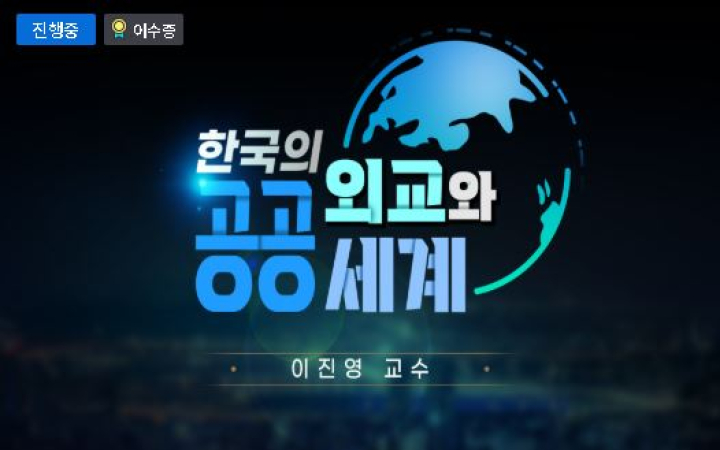 Public Diplomacy and the World
Public Diplomacy and the World(Lecture included) Korea’s Public Diplomacy and the World
Course Titile Korea’s Public Diplomacy and the World Professor Jean Young Lee, Inha University Course Overview This lecture aims to explore how public diplomacy, a crucial aspect of international relations in the 21st century, is evolving in Korea and to provide an understanding of its various aspects. Course Schedule (Click on the titles below)
- 2025-04-30
- 576
-
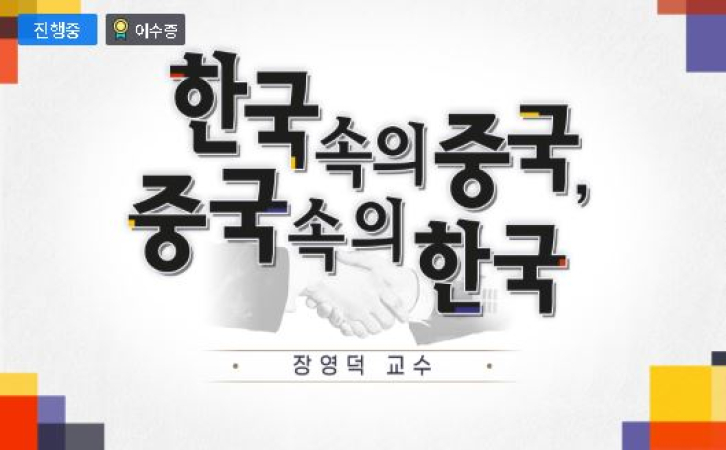 Public Diplomacy and the World
Public Diplomacy and the World(Lecture included) China in Korea and Korea in China
Course Titile China in Korea, Korea in China Professor Young Duk Jang, Inha University Course Overview By examining China within Korea and Korea within China from the perspective of cultural exchange, this aims to enhance mutual understanding between Korea and China. Cultural exchange plays a very important role in international relations, especially when the relationship is tense. Therefore, by thoroughly understanding the content and forms of cultural exchange between the two countries, it is possible to promote mutual understanding between their peoples. Course Schedule (Click on the titles below)
- 2025-04-23
- 624
-
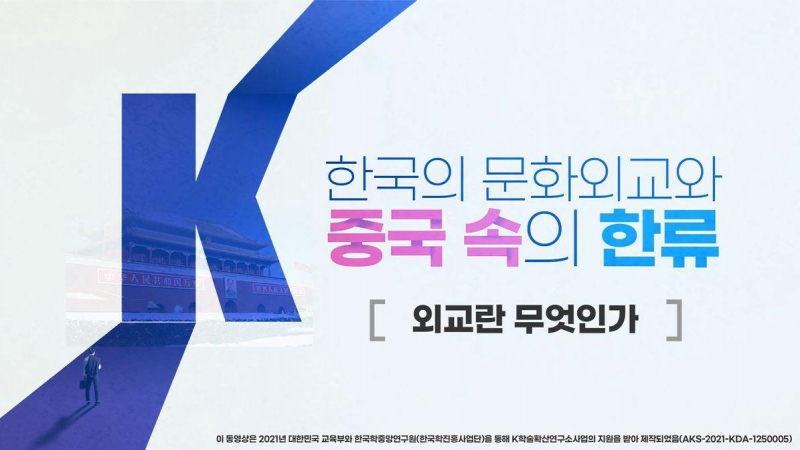 Public Diplomacy and the World
Public Diplomacy and the World(Lecture included) Korea’s Cultural Diplomacy and the Korean Wave (Hallyu) in China
COURSE NAME Korea’s Cultural Diplomacy and the Korean Wave (Hallyu) in China PROFESSOR Young Duk Jang / Dept. of Political Science & International Relations, Inha University COURSE OVERVIEW Korea is rising as a representative cultural powerhouse. And Hallyu plays an important role in the diplomatic arena and has become the foundation of Korea’s cultural diplomacy. Besides, China is a country that has maintained close cultural ties with Korea for a long time. So, what is cultural diplomacy in Korea, and what does the Hallyu look like in China? This lecture will introduce you all, to Korea's cultural diplomacy and the Hallyu in China in detail. Course Schedule (Click on the titles below) Week Title 1 What is Cultural Diplomacy? 2 Theory and Practice of Cultural Diplomacy 3 The Development of Korean Cultural Diplomacy 1 4 The Development of Korean Cultural Diplomacy 2 5 Korean Pop Culture and Hallyu 6 The Development Process and Achievements of Hallyu 7 Hallyu in China 1 8 Hallyu in China 2 9 Hallyu in China 3 10 Hallyu in China 4
- 2022-09-23
- 1512
-
-
 Content Convergence
Content Convergence(Lecture included)Korean cinema: a view from Russia
Course Titile Korean cinema: a view from Russia Professor Rimma Tangalycheva (Saint Petersburg State University) Course Overview This course provides an overview of Korean cinema from its invention to the present day. The purpose of the course is to acquaint students interested in Korean studies with the main achievements of Korean cinema. Attention is paid to the history of Korean cinema of the 20th century, the work of the popularizer of Korean history and culture Im Kwon-taek. Today, the international and festival success of Korean cinema is associated with directors such as Lee Chang-dong, Bong Joon-ho, and Hong Sang-soo, and their films are also covered in this course. The course includes a sociological analysis of Yeong Sang-ho's "Train to Busan", which presents alternative scenarios for the future in the modern world and has become very popular in different countries of the world. The final lecture “Feminist Wave in South Korean Cinema" is dedicated to the achievements of the young generation of female directors. The peculiarity of the course is that it represents the Russian vision of Korean cinema, a specific view of Russian viewers and film critics. Another distinguishing feature of the course is that it analyzes contemporary South Korean films from a sociological perspective. Course Schedule Week 1 Introduction. History of Korean Cinema Week 2 Im Kwon-taek: the Living Legend of Korean Cinema Week 3 The Sorrowful Realism of Lee Chang-dong Week 4 Bong Joon-ho: Cinema for Social Change? Week 5 Zombie Apocalypse Yeon Sang-ho Week 6 Mathematical Impressionism by Hong Sang-soo Week 7 Feminist Wave in South Korean Cinema
- 2025-06-16
- 493
-
 Content Convergence
Content Convergence(Lecture included) Understanding Korean Culture through Korean Dance II (Globalization of Korean Dance)
Course Titile Understanding Korean Culture through Korean Dance II (Globalization of Korean Dance) Professor Min A Yang (Chung-Ang University) Course Overview This lecture will examine the changes in traditional Korean dance from the mid-19th century to the end of the Joseon Dynasty as it interacted with other cultures. In particular, we will examine the globalization process of Korean dance through the tendency of Korean dance to be enjoyed by Korean people scattered around the world since the mid-19th century. First, we will examine the migration history of the Korean diaspora to the former Soviet Union (Russia and Central Asia), Yanbian, China, Japan, and Hawaii, USA, and how the traditional performing arts represented by dance are enjoyed and the meaning of traditional performing arts activities in diaspora cultures. On the other hand, Korean people who lived in the former Soviet Union have been re-migrating to Korea since the 2000s, forming a reversed form of diaspora in Korean society and engaging in various cultural and artistic activities. In this lecture, we will consider the social role and value of performing arts activities in the era of interculturalism through the example of the cultural activities of the Gwangju Korean Village. Course Schedule Week 1 History of modernizing and globalizing traditional dance of the Joseon dynasty Week 2 Goryeoin in Primorsky and modernizing performing art of the Joseon dynasty during the Japanese colonial period Week 3 Goryeoins’ performing art and Korea theaters during Soviet Union period Week 4 The art performance and meaning to Goryeoin after dissolution of Soviet Union Week 5 Korean in Yanbian, China’s performing art activities Week 6 Korean Japanese’s performing art activities Week 7 Korean in Hawaii performing art activities
- 2025-06-13
- 529
-
 Content Convergence
Content Convergence(Lecture included) East Asian States’ Leadership in International Law
Course Titile East Asian States’ Leadership in International Law Professor Seokwoo Lee (Inha Law School) Course Overview This lectures will provide for enhancing discussions and dialogue to advance what Western scholars might classify as “outsiders’ perspectives” to international law, which are currently not present within mainstream international law textbooks. Course Schedule Week 1 East Asian States’ Leadership in International Law Week 2 East Asian States’ Leadership in International Law 2 Week 3 East Asian States’ Leadership in International Law 3 Week 4 Asian State Practice in the Domestic Implementation of International Law 1 Week 5 Asian State Practice in the Domestic Implementation of International Law 2 Week 6 East Asia’s Cultural Influence on the Law of the Sea 1 Week 7 East Asia’s Cultural Influence on the Law of the Sea 2
- 2025-06-13
- 483
-
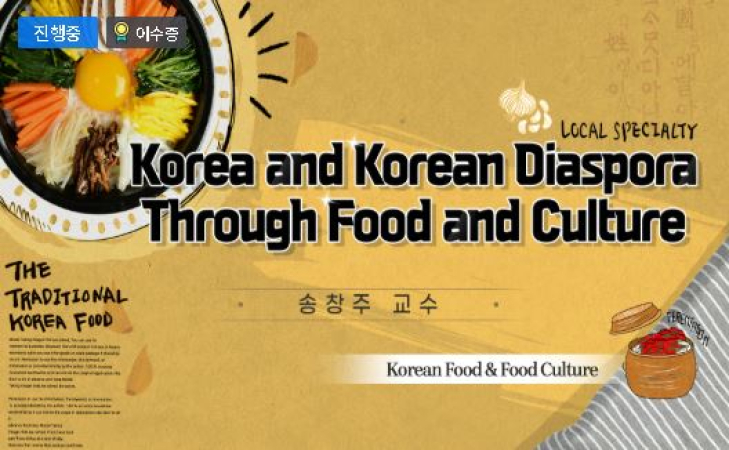 Content Convergence
Content Convergence(Lecture included) Korea and Korean Diaspora Through Food and Culture
Course Titile Korea and Korean Diaspora Through Food and Culture Professor Chang Zoo Song, University of Auckland Course Overview This course is to help the general public to understand the social and cultural history of Korea and Koreans in and out of Korea through their past and present food and culinary practices. Course Schedule (Click on the titles below)
- 2025-04-29
- 570
-
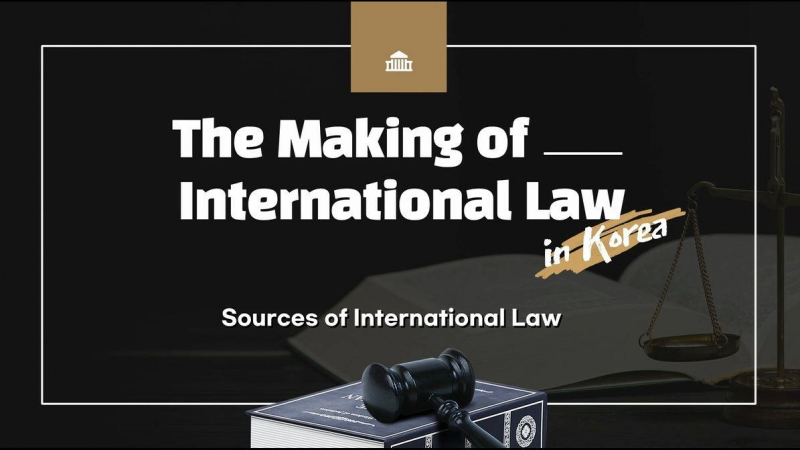 Content Convergence
Content Convergence(Lecture included) The Making of International Law in Korea
COURSE NAME The Making of International Law in Korea PROFESSOR Seok Woo Lee, Inha Law School COURSE OVERVIEW This class addresses the developments of international law in Korea, from human rights concerns to law of the sea issues; from maritime delimitation and access to ocean resources to other non-security matters. It attempts to demonstrate to students the increasingly important role of international law in Northeast Asia. Korea, in particular, can no longer ignore the age-old global question: should states obey international law, and if so, why? For the Republic of Korea, the answer to this question is of utmost importance given its precarious position between two world powers, China and Japan, and its volatile neighbor to the north, the Democratic People’s Republic of Korea. The purpose of this class is to help students of international law, particularly those in Korea, to understand and appreciate the significance of international law to the international relations of Korea. Course Schedule (Click on the titles below) Week Title 1 Notes on International Law in General 2 Korea’s Encounter with the Modern International Legal System 3 The Development of International Law in Korea 4 The Legacy of Colonialism 5 The Legacy of Colonialism / International Legal Issues arising from the Korean War and Inter-Korean Relations 6 International Legal Issues arising from the Korean War and Inter-Korean Relations 7 Territorial Disputes - General and Specific Discussion of Particular Cases: Dokdo 8 Democracy and International Human Rights Law 9 Law of the Sea 10 Korea-US Relationship from the Perspective of International Law / The Making of International Law in Korea
- 2022-09-23
- 1503
Publications
-
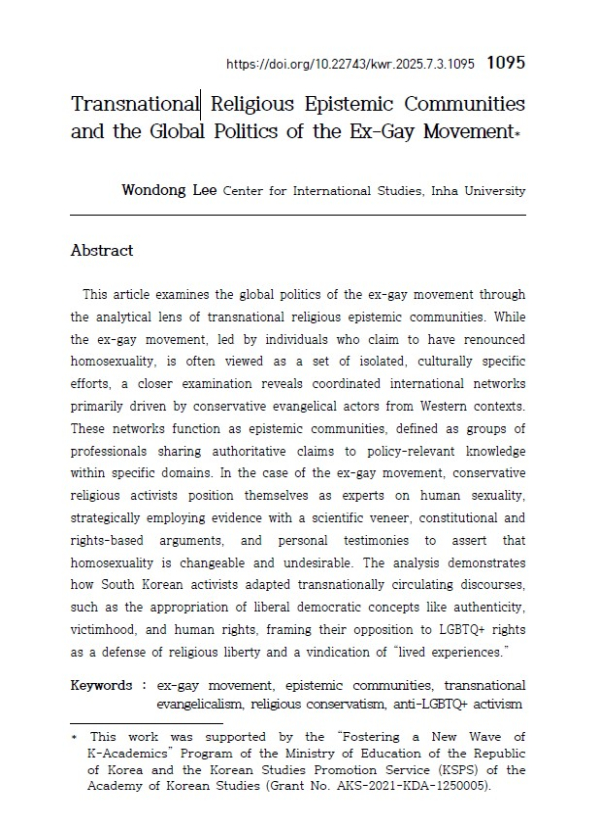 Journal Article
Journal ArticleTransnational Religious Epistemic Communities and the Global Politics of the Ex-Gay Movement (Wondong Lee)
- 발간일2025-06-16
- 조회수463
-
 Journal Article
Journal ArticleThe Serial Transnational Mobility and Urban Experiences of Korean Cubans in Miami, Florida*(Jin Suk Bae)
- 발간일2024-09-09
- 조회수758
-
 Journal Article
Journal ArticleCross-Border Data Dynamics : An Analysis of China's Cybersecurity Law under TBT Compliance* (Yin Zhan, Youngduk Jang)
- 발간일2024-09-06
- 조회수766
-
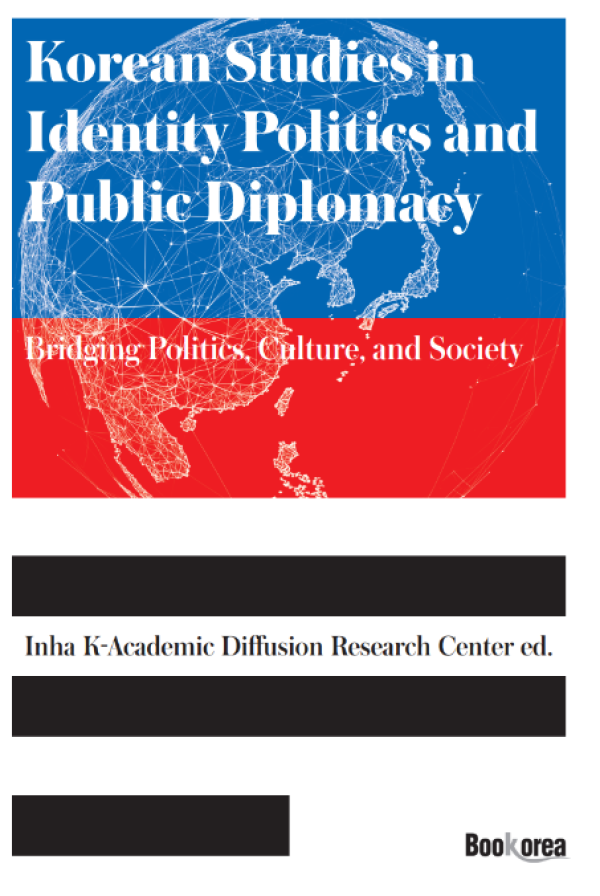 Research Archive
Research Archive[English Textbook] Korean Studies in Identity Politics and Public Diplomacy: Bridging Politics, Culture, and Society
- 발간일2026-01-27
- 조회수83
-
 Research Archive
Research Archive[Korean Studies Monograph] Current Status and Future Directions of Global Korean Studies - Politics of Identity and Public Diplomacy in Korean Studies
- 발간일2024-10-07
- 조회수637
-
- 발간일
- 조회수
-
International Conference
Zainichi Koreans and the Politics of Identity in Korea–Japan Relations from the Perspective of Korean Studies
Zainichi Koreans and the Politics of Identity in Korea–Japan Relations from the Perspective of Korean Studies K-Academics Diffusion Research Center at Inha Center for International Studies held an international academic conference on January 10, 2026, at Hokkaido University in Japan under the theme “Zainichi Koreans and the Politics of Identity in Korea–Japan Relations from the Perspective of Korean Studies. This conference was organized to commemorate the 60th anniversary of the normalization of diplomatic relations between Korea and Japan. It aimed to analyze the historical experiences and diasporic lives of Zainichi Koreans through the lens of Korean Studies, while exploring new possibilities for academic and cultural cooperation between the two countries. The event was jointly hosted by the Graduate School of Public Policy at Hokkaido University, the Research Center for Korean Studies at Kyushu University, and the Kyushu Korean Studies Scholars Forum, with support from the Academy of Korean Studies. The first session, titled “Solidarity between Zainichi Koreans in Hokkaido and Local Communities,” featured in-depth discussions. Yoshihiko Tonohira, Representative Director of the East Asia Civic Network, presented efforts toward reconciliation and peace-building between Korean and Japanese civil societies through a workshop on the excavation of remains of victims of forced mobilization. Hideaki Iijima, Executive Committee Member of the Citizens’ Council for Ainu Policy Review, introduced grassroots-based initiatives that foster a more tangible, citizen-centered Korea–Japan relationship. The second session, “The Multilayered Nature of Identity: Generations and Culture,” revisited the historical practices of Zainichi Koreans in postwar Japan and their positioning during the normalization of diplomatic relations. In the final session, titled “New Horizons in Korean Studies,” participants discussed the achievements of K-Academics Diffusion Research Center at Inha University and explored strategies for the regional expansion of Korean Studies, including comparative discussions on the identity of Korean communities in Taiwan. Building on the momentum of this international conference in Hokkaido, Project from the K-Academics Diffusion Research Center at Inha University plans to further expand Korean Studies–based academic and educational cooperation across East Asia, including Japan.
- 2026-01-22
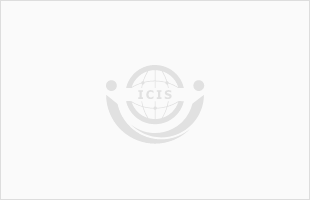
-
International Conference
Shifts in the East Asian Order and the Construction of New Models of Cooperation
Shifts in the East Asian Order and the Construction of New Models of Cooperation The K-Academics Diffusion Research Center at the Inha Center for International Studies(Inha CIS) held an international academic conference on January 9, 2026, at Hokkaido University in Japan under the theme “Shifts in the East Asian Order and the Construction of New Models of Cooperation.” In the first session, titled “Changes in the East Asian Order and New Models of Cooperation,” in-depth discussions were conducted on a socio-psychological analysis of Korean attitudes toward Japan and strategies for East Asian financial cooperation. Professor Jun-Young Choi of Inha University demonstrated that Korean foreign policy preferences toward Japan are not shaped by a simple ideological dichotomy, but rather by underlying psychological mechanisms such as Right-Wing Authoritarianism (RWA), which prioritizes order and security, and Social Dominance Orientation (SDO), which reflects the acceptance of hierarchical social structures. Professor Jae-Hwan Jung of Inha University then analyzed the polycrisis generated by the instability of the U.S. dollar–centered hegemonic system. He proposed policy alternatives calling for East Asian countries to strengthen the Chiang Mai Initiative Multilateralisation (CMIM) as a regional financial safety net and to secure the legitimacy of capital controls in order to safeguard monetary sovereignty. The second session, a roundtable entitled “Building New Models of Cooperation through the Dissemination of Korean Studies: Achievements and Reflections,” provided a platform for sharing both the outcomes and future challenges of cooperation driven by the expansion of Korean Studies. Key achievements included the establishment of a “practical and integrative Korean Studies” model that transcends the traditional focus on classical language and literature by integrating social sciences such as politics, economics, and public policy, as well as the development of a digitally based hybrid education infrastructure. In particular, the conference confirmed growing demand for Korean Studies within regional hub universities, including Hokkaido University in Japan, demonstrating the viability of locally tailored strategies. Looking ahead, participants emphasized the importance of moving beyond one-directional promotional lectures toward a more “objective Korean Studies,” and of fostering a self-sustaining and durable Korean Studies ecosystem grounded in networks of both academic and interpersonal trust among scholars. Project from the K-Academics Diffusion Research Center at Inha University plans to further expand Korea studies–based academic and educational cooperation in East Asia, including the Japanese region, building on the momentum of this international conference held in Hokkaido.
- 2026-01-22

-
K-Academic Diffusion Activities
Successful Conclusion of the K-Connectors 3rd Cohort Achievement Presentation... Sharing Outcomes of Student-Led Korean Studies Initiatives
The K-Academic Diffusion Research Center at Inha Center for International Studies at Inha University held the ‘K-Connectors 3rd Cohort Achievement Presentation’ on January 15th, at the International Conference Hall within Inha University’s Jungseok Memorial Library. This event, which concluded successfully, served as a platform for sharing the outcomes of projects planned and operated directly by university students. These projects aimed to disseminate Korean studies, with a focus on the social sciences. A total of 27 participants attended this event, including students from the 3rd cohort of the K-Connectors and representatives from the Inha Center for International Studies. The 3rd cohort of the K-Connectors operated by having students participating in teams to autonomously plan and execute projects. Each team carried out their project over approximately six months, with their activities and outcomes evaluated based on both quantitative and qualitative indicators. This added significance by establishing an evaluation system that comprehensively reviewed palnning capabilities, execution skilles, and possibility of diffusion, going beyond a simple results-oriented assessment. The presentation session was conducted using both poster displays and presentations utilizing powerpoint slides and final reports. This allowed the participants to engage with each team’s project in diverse ways, enabling a more multidimensional understanding of the research outcomes and activity processes. The event featured awards for outstanding teams and individuals, with the ‘KOREA: F5’ team receiving the honor of being selected as the grand prize winner for their ‘THE MOST’ project targeting Sakhalin compatriots. ▲ Korea: F5 The ‘Korus’ team, which carried out diverse projects such as ‘A World Created Together with Rainbow Voices’ for refugee children, was selected as the top team. ▲ Korus The ‘Injeolmi’ team, which contributed to spreading Korean studies through the ‘Onggijonggi’ and ‘Je-dae-bap-dae’ projects targeting multicultural families and both Koreans and foreigners, was selected as an outstanding team. ▲ Injeolmi Additionally, Lee, Jae-yoon (Dept. of English Language and Literature, Junior student) from the ‘Together K-hada(’hada’ = ‘do’ in Korean)’ team and Shin, Yu-seong (Dept. of Korean Language and Literature, Junior student) from the ‘Korus’ team were each selected as outstanding participants and received awards. The awardees were highly praised for the completeness of their project planning, consistent participation in activities, and contributions ot the spread of Korean studies. The selected outstanding teams and participants are scheduled to take part in the academic exchange visit to Fukuoka, Japan, planned for February 25th. During this visit, they will present the results of the K-Connectors 3rd cohort activity on an international level and share examples of university student-led projects for the dissemination of Korean studies with overseas researches and relevant stakeholders. The K-Academic Diffusion Research Center is disseminating Korean studies through the K-Connectors program in more diverse ways and laying the groundwork for the younger generation to grow as key players in academic exchange and public diplomacy. The center stated, “We plan to continue operating the K-Connectors program going forward and provide active support and promotion to ensure Korean studies expands academically and socially both domestically and internationally.”
- 2026-01-15
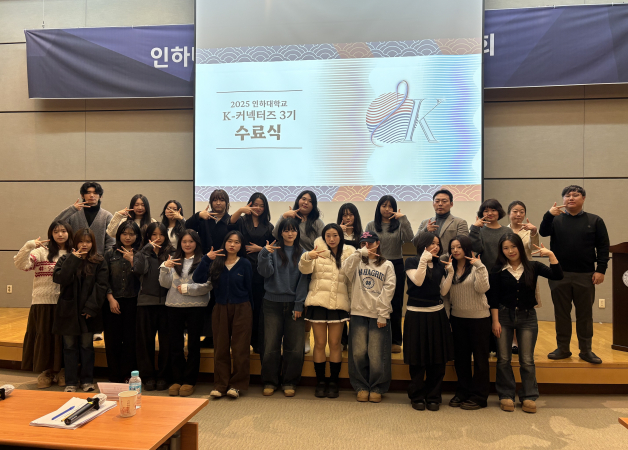
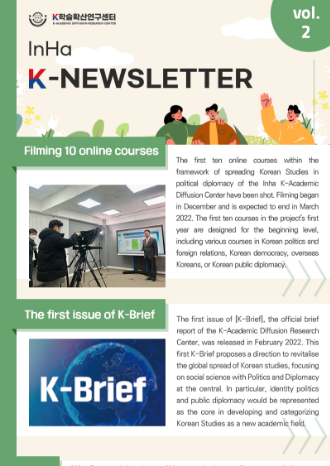
Newsletter Subscribe
Subscribe and get useful information about our K-Academic Diffusion Research Center.




